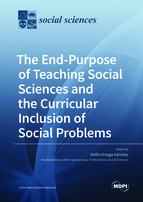The End-Purpose of Teaching Social Sciences and the Curricular Inclusion of Social Problems
A special issue of Social Sciences (ISSN 2076-0760).
Deadline for manuscript submissions: closed (21 September 2021) | Viewed by 44576
Special Issue Editor
Interests: education and citizenship in the global era; education for sustainability; gender equality and women's empowerment (goal 5: sustainable development objectives); curricular inclusion of social problems in education; anthropology and teaching of the social and human sciences; language and literature didactics; mixed methods research
Special Issues, Collections and Topics in MDPI journals
Special Issue Information
Dear Colleagues,
The most recent scientific literature on the treatment of social problems or controversial social questions in the Social Sciences classroom and their inclusion into curricula emphasizes the need to introduce students into large-scale social debates where different points of view exist, different interests are at stake, and where it is desirable that they construct their own opinions in that respect from a critical and reasoned perspective. Work with social problems permits a typology of analysis that includes the relative experience of the past and the expectations for the future in a present that is lived, and to consider the temporal relation on the basis of an analysis of changes and continuities that are observable from a comparative perspective. In the comprehension and interpretation of the historicity of the present and in planning the social future, social problems would have to represent a fundamental curricular tenant that gives relevance to the contemporaneousness of the student.
This Special Issue aims to answer the following research questions with theoretical and empirical studies:
- What are the purposes of teaching history and social sciences at today’s schools?
- What is the place of social thought formation and social problems in learning/teaching in Social Sciences?
Prof. Dr. Delfín Ortega-Sánchez
Guest Editor
Manuscript Submission Information
Manuscripts should be submitted online at www.mdpi.com by registering and logging in to this website. Once you are registered, click here to go to the submission form. Manuscripts can be submitted until the deadline. All submissions that pass pre-check are peer-reviewed. Accepted papers will be published continuously in the journal (as soon as accepted) and will be listed together on the special issue website. Research articles, review articles as well as short communications are invited. For planned papers, a title and short abstract (about 100 words) can be sent to the Editorial Office for announcement on this website.
Submitted manuscripts should not have been published previously, nor be under consideration for publication elsewhere (except conference proceedings papers). All manuscripts are thoroughly refereed through a double-blind peer-review process. A guide for authors and other relevant information for submission of manuscripts is available on the Instructions for Authors page. Social Sciences is an international peer-reviewed open access monthly journal published by MDPI.
Please visit the Instructions for Authors page before submitting a manuscript. The Article Processing Charge (APC) for publication in this open access journal is 1800 CHF (Swiss Francs). Submitted papers should be well formatted and use good English. Authors may use MDPI's English editing service prior to publication or during author revisions.
Keywords
- end-purposes of Social Sciences teaching
- relevant social problems
- social thought
- education for democratic citizenship






